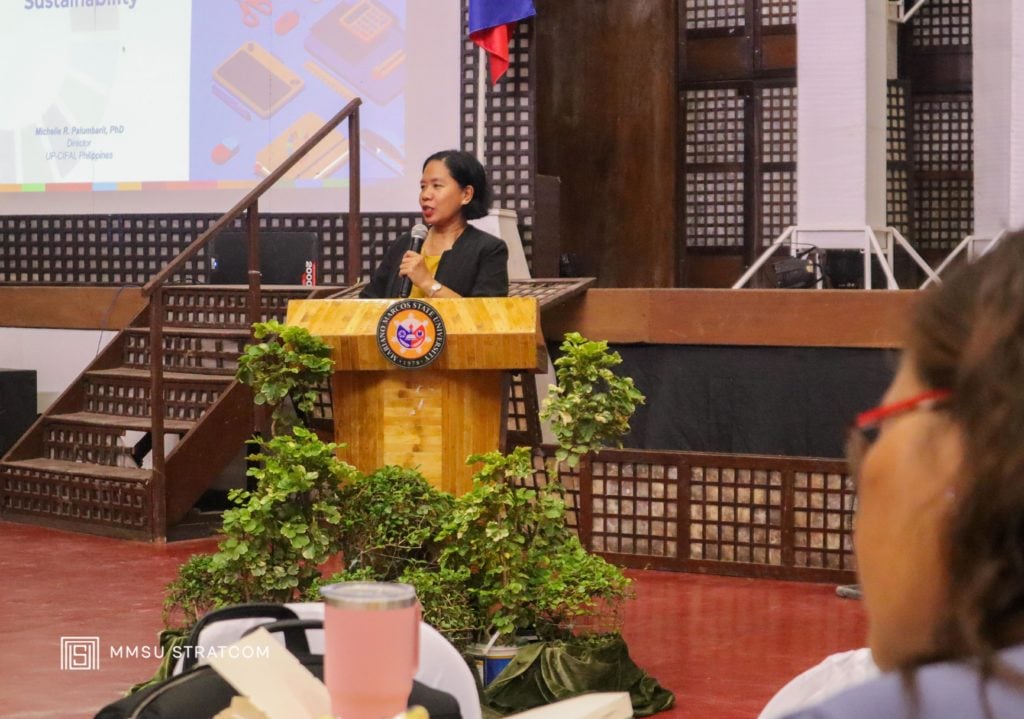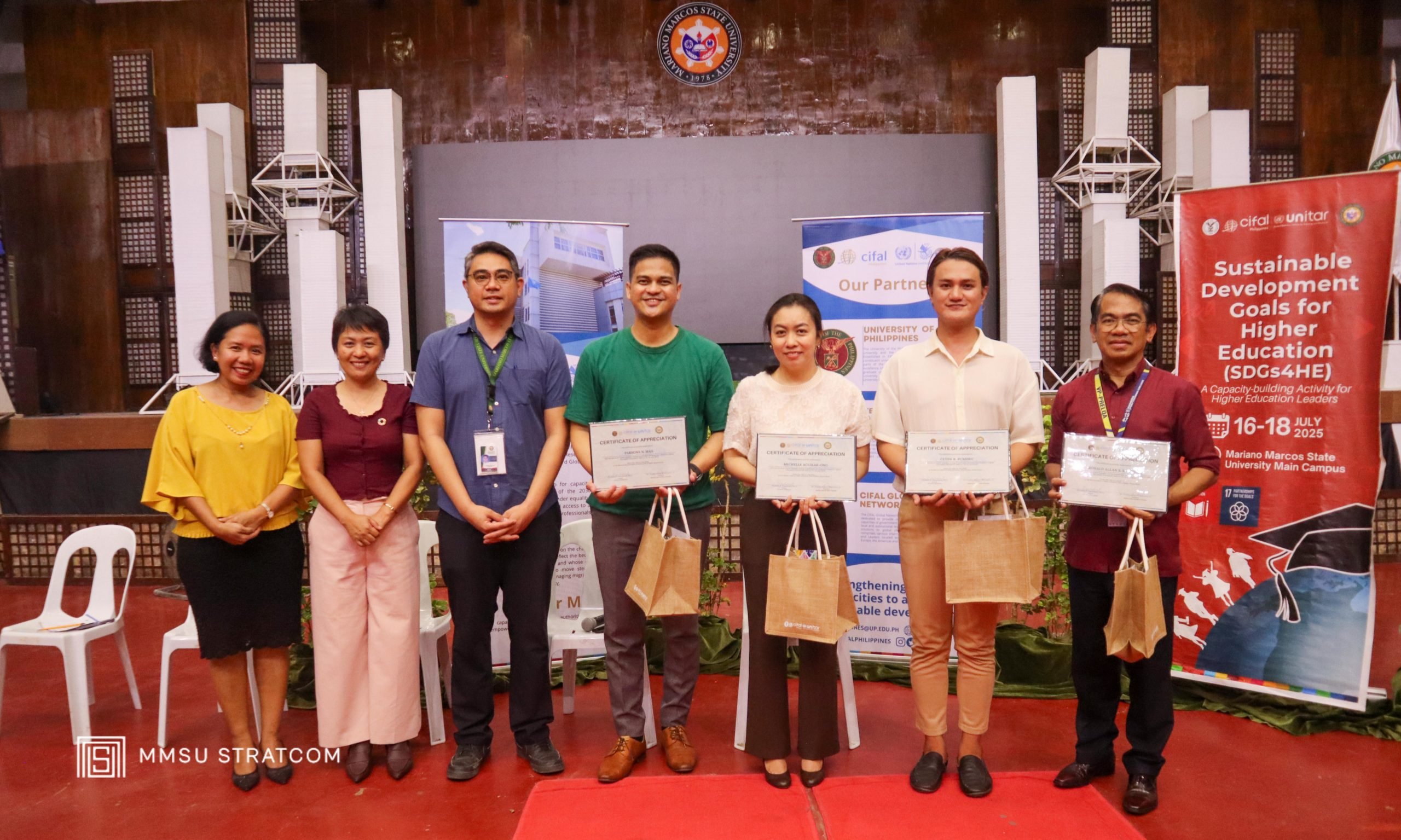18 July 2025—The University of the Philippines – Centre International de Formation des Autorités et Leaders (UP-CIFAL) Philippines, in partnership with the Mariano Marcos State University (MMSU), successfully concluded a three-day orientation on the Sustainable Development Goals for Higher Education (SDGs4HE) from July 16 to 18, 2025. The event gathered over 120 faculty members, administrators, staff, and students to explore how higher education institutions (HEIs) can champion sustainable development through their core functions: teaching, research, and community engagement.

The SDGs4HE workshop aimed to raise awareness and foster institutional integration of the 17 United Nations Sustainable Development Goals (SDGs), with particular attention to their application in higher education. Through keynote presentations, expert lectures, and collaborative workshops, participants were equipped with the knowledge and tools necessary to drive sustainability within their campuses and communities.
Opening the event, Dr. Bobby A. Eclarin, Chief of Green Innovation at MMSU, expressed gratitude to UP-CIFAL Philippines for extending its SDG capacity-building program to MMSU. He underscored the vital role that HEIs play in addressing today’s pressing challenges by aligning education with the global sustainable development agenda. “Together we can make higher education part of our sustainable change,” he said.

Dr. Michelle R. Palumbarit, Director of UP-CIFAL Philippines, highlighted the program’s vision of empowering academic institutions to take ownership of the SDGs. She acknowledged MMSU’s dedication to this endeavor, as well as the tireless efforts of the university’s Sustainability and Futures Thinking Office led by Dr. Arlene Gonzales. MMSU Vice President for Planning and Strategic Foresight Mee Jay Domingo highlighted the university’s notable achievements in 2023, particularly its placement in the Times Higher Education (THE) Impact Rankings within the 401-600 bracket. He stressed that while accolades are appreciated, the university’s priority must remain on advancing the SDGs. Speaking on the significance of the SDGs4HE program, Mr. Domingo described it as a valuable opportunity “to learn and ignite our passion in the world we want to live in.”
The first day laid the foundation with sessions on the history, principles, and interconnected nature of the SDGs. Programme Officers Mr. Andrei Josef Policarpio and Ms. Stephanie Nicole Cruz from UP-CIFAL contextualized the goals in relation to the academic mandate of HEIs.

Dr. Michelle Palumbarit emphasized that universities are not only centers of learning but also incubators for innovation, social transformation, and ethical leadership. She encouraged institutions to adopt a whole-of-university approach by embedding sustainability not just in academic curricula but also in operations, governance, and partnerships.

Mx. Clyde B. Pumihic of Ifugao State University and Dr. Parsons N. Hail of Central Luzon State University (CLSU) presented real-world applications of SDG-aligned education, highlighting the importance of indigenous knowledge systems and global-local linkages. CLSU’s efforts in integrating SDGs in policy, research, and student engagement offered a replicable model for MMSU.

The second day shifted toward institutional strategies. Dr. Stephenie Busbus emphasized the need for HEIs to identify their unique contributions to the SDGs. She discussed the integration of sustainability into academic offerings and highlighted Saint Louis University’s (SLU) tiered leadership approach and curriculum mapping as models for systemic change.
Dr. Virgilio Julius Manzano Jr., President of MMSU, formally inaugurated the SDG Corner, a dedicated space on campus designed to serve as a hub for sustainability learning and collaboration. He described the SDG Corner as a tangible reflection of the university’s commitment to sustainable development, expressing hopes that it would eventually evolve into a larger facility dedicated to sustainability research and advocacy.
Dr. Lawrence V. Madriaga highlighted the importance of integrating the UN SDGs in HEIs, not only as a moral imperative but as a strategic advantage. He further stressed that the call is to “walk the talk”, believing in the transformative potential of sustainability not just for institutional improvement but for shaping a more just and resilient society.

Dr. Gino Angelo Velasco of UP Diliman’s Ugnayan ng Pahinungód Office expanded the discussion to community engagement. He encouraged the audience to adopt a strengths-based and people-centered approach to development. Drawing on examples from UP’s volunteer programs, he stressed the need for universities to design service-learning initiatives that are co-produced with communities and grounded in local realities.
Dr. Redento Recio focused his presentation on urban SDGs, particularly SDG 11: Sustainable Cities and Communities, while situating the discussion within the broader challenge of embedding the SDGs in higher education and grassroots scholarly engagement.

The third day was dedicated to interactive workshops and institutional planning. Dr. Arlene Gonzales of MMSU led the session on operationalizing a sustainability roadmap. Participants from various units and colleges were grouped to assess MMSU’s current efforts and identify pathways for deeper SDG integration.
Group presentations showcased a wide range of proposed solutions in various issues including water and waste management, mental health and well-being, research and innovation, and sustainability.
Student leaders from the University Student Council also presented their action plan, emphasizing the need for improved access to clean drinking water, proper waste segregation, expanded reproductive health services, and stronger participation in university decision-making. They reiterated that students are not just beneficiaries of sustainability initiatives, but active co-creators of change.

Throughout the workshops, participants recognized both the strengths and gaps of MMSU’s sustainability efforts. While the university has initiated programs on water conservation, mental health, and community extension, institutional coordination, policy formalization, and consistent monitoring were identified as key areas for improvement.
The discussions also underscored the need for a whole-of-institution approach. Whether through curriculum reform, policy review, or community outreach, sustainable development must be woven into the fabric of university life. Dr. Arlene Gonzales emphasized that clear indicators and impact assessment tools are essential to ensure that these initiatives produce meaningful, measurable outcomes.
With renewed momentum and a clearer roadmap, MMSU is poised to lead in integrating sustainable development within higher education in the region, inspiring other academic institutions to follow suit.
*All photo credits to MMSU Stratcom

![[RIGHT]unitar_logo](https://cifal.up.edu.ph/wp-content/uploads/2024/01/RIGHTunitar_logo.png)
